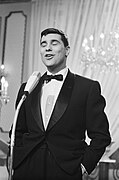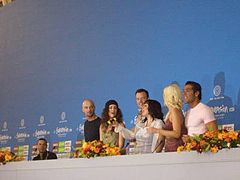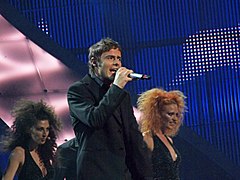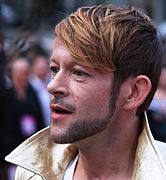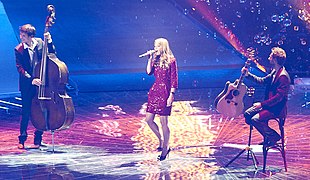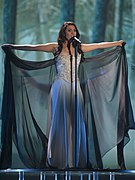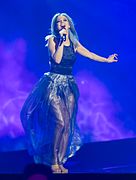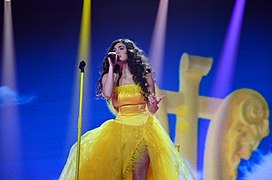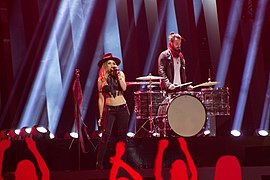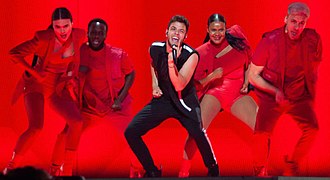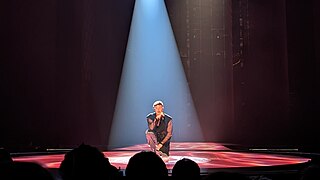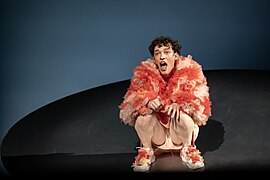Switzerland has participated in the Eurovision Song Contest 64 times since its debut at the first contest in 1956, missing only four contests because of being relegated due to poor results the previous year: 1995, 1999, 2001, and 2003. Switzerland hosted the inaugural contest in 1956 in Lugano, where it also won. The country claimed its second victory in 1988, 32 years after the first, and its third in 2024, 36 years after the second win. The Swiss participant broadcaster in the contest is the Swiss Broadcasting Corporation (SRG SSR).
| Switzerland in the Eurovision Song Contest | |
|---|---|

| |
| Participating broadcaster | Swiss Broadcasting Corporation (SRG SSR) |
| Participation summary | |
| Appearances | 64 (53 finals) |
| First appearance | 1956 |
| Highest placement | 1st: 1956, 1988, 2024 |
| Host | 1956, 1989, 2025 |
Participation history
| |
| External links | |
| Switzerland's page at Eurovision.tv | |
Switzerland in the Eurovision Song Contest 2024 | |
"Refrain" performed by Lys Assia won the inaugural contest in 1956 for Switzerland; she returned to place second in 1958 with "Giorgio". The country achieved second place with "T'en va pas" by Esther Ofarim (1963) and "Pas pour moi" by Daniela Simmons (1986), and third place with "Nous aurons demain" by Franca di Rienzo (1961) and "Amour on t'aime" by Arlette Zola (1982). It won for the second time in 1988 with "Ne partez pas sans moi" performed by Céline Dion. "Moi, tout simplement" by Annie Cotton secured Switzerland's 15th top-five finish by placing third in 1993.
Since the introduction of the qualifying round in 1993, Switzerland has reached the top ten only four times. Since the semi-final round's inception in 2004, the country has failed to reach the final in 11 of 19 contests, finishing last in the semi-final on four occasions. Switzerland returned to the top five after 26 years when "She Got Me" by Luca Hänni finished fourth in 2019, achieving the country's 16th top-five result. This was followed by "Tout l'univers" by Gjon's Tears placing third in 2021, marking the 17th top-five finish. Switzerland won the contest for the third time in 2024, with "The Code" by Nemo. The country has also finished last in the semi-finals four times since 2004, with "Celebrate" by Piero and the MusicStars (2004), "Il pleut de l'or" by Michael von der Heide (2010), "Time to Shine" by Mélanie René (2015), and "The Last of Our Kind" by Rykka (2016).
Participation
The Swiss Broadcasting Corporation (SRG SSR) is a full member of the European Broadcasting Union (EBU), thus eligible to participate in the Eurovision Song Contest. It has participated in the contest representing Switzerland since the first contest in 1956.
Switzerland has four official languages, French, German, Italian, and Romansh. For intermittent periods prior to its abolition in 1999, the rules stated that the song had to be performed in an official language, which gave SRG SSR leeway as it could submit entries in any of the four languages. Out of its 64 appearances in the contest, it has sent 65 songs, 24 of which were in French,[a] 12 in German, 18 in English, 10 in Italian, and one in Romansh. The first two of Switzerland's winning songs were sung in French, with the third being sung in English.
SRG SSR has used a mix of different selection processes to determine its entry in each year's contest. Since 2019, it has used an internal selection process, although televised national finals were used in previous years, held under various names including Concours Eurovision from the 1950s to 2000s, and Die Grosse Entscheidungsshow between 2011 and 2018. In the 1980s, the Swiss national finals tended to have ten participating songs each year: three in French, three in German, three in Italian, and one in Romansch.
Participation overview
| 1 | First place |
| 2 | Second place |
| 3 | Third place |
| ◁ | Last place |
| X | Entry selected but did not compete |
| † | Upcoming event |
Congratulations: 50 Years of the Eurovision Song Contest
| Artist | Song | Language | At Congratulations | At Eurovision | |||||
|---|---|---|---|---|---|---|---|---|---|
| Final | Points | Semi | Points | Year | Place | Points | |||
| Céline Dion | "Ne partez pas sans moi" | French | Failed to qualify | 10 | 98 | 1988 | 1 | 137 | |
Hostings
| Year | Location | Venue | Presenter(s) |
|---|---|---|---|
| 1956 | Lugano | Teatro Kursaal | Lohengrin Filipello |
| 1989 | Lausanne | Palais de Beaulieu | Lolita Morena and Jacques Deschenaux |
| 2025 | Basel | St. Jakobshalle | Hazel Brugger, Sandra Studer (all shows) and Michelle Hunziker (final) |
Awards
Marcel Bezençon Awards
| Year | Category | Song | Composer(s) lyrics (l) / music (m) |
Performer | Final | Points | Host city | Ref. |
|---|---|---|---|---|---|---|---|---|
| 2021 | Composer Award | "Tout l'univers" | Gjon Muharremaj, Xavier Michel, Wouter Hardy & Nina Sampermans (m & l) | Gjon's Tears | 3 | 432 | ||
| 2024 | Composer Award Artistic Award[e] |
"The Code" | Benjamin Alasu, Lasse Midtsian Nymann, Linda Dale, Nemo Mettler (m&l) | Nemo | 1 | 591 |
Related involvement
Conductors
| Year | Conductor[f] | Notes | Ref. |
|---|---|---|---|
| 1956 | Fernando Paggi | [g] | [4] |
| 1957 | [h] | ||
| 1958 | Paul Burkhard | ||
| 1959 | [i] | ||
| 1960 | Cédric Dumont | ||
| 1961 | Fernando Paggi | ||
| 1962 | Cédric Dumont | ||
| 1963 | [j] | ||
| 1964 | Fernando Paggi | ||
| 1965 | Mario Robbiani | ||
| 1966 | [k] | ||
| 1967 | Hans Moeckel | ||
| 1968 | Mario Robbiani | ||
| 1969 | |||
| 1970 | [5] | ||
| 1971 | Hardy Schneiders | ||
| 1972 | |||
| 1973 | |||
| 1974 | |||
| 1975 | Peter Jacques | ||
| 1976 | Mario Robbiani | ||
| 1977 | Peter Jacques | ||
| 1978 | |||
| 1979 | |||
| 1980 | Peter Reber | [6] | |
| 1981 | |||
| 1982 | |||
| 1983 | Robert Weber | [l] | |
| 1984 | Mario Robbiani | ||
| 1985 | Anita Kerr | ||
| 1986 | |||
| 1987 | No conductor | ||
| 1988 | |||
| 1989 | [m] | ||
| 1990 | Bela Balint | ||
| 1991 | |||
| 1992 | Roby Seidel | ||
| 1993 | Marc Sorrentino | ||
| 1994 | |||
| 1996 | |||
| 1997 | |||
| 1998 | No conductor |
Heads of delegation
Each participating broadcaster in the Eurovision Song Contest assigns a head of delegation as the EBU's contact person and the leader of their delegation at the event. The delegation, whose size can greatly vary, includes a head of press, the performers, songwriters, composers, and backing vocalists, among others.[7]
Commentators and spokespersons
This section needs additional citations for verification. (February 2020) |
Over the years SRG SSR has broadcast the Eurovision Song Contest in Switzerland on its three television stations: German-language Schweizer Radio und Fernsehen (SRF), French-language Radio télévision suisse (RTS), and Italian-language Radiotelevisione svizzera di lingua italiana (RSI).
| Year | Commentator | Spokesperson | Ref. | ||
|---|---|---|---|---|---|
| SRF | RTS | RSI | |||
| 1956 | Fritz Schäuffele[13] | Raymond Colbert[14] | No broadcast | No spokesperson | |
| 1957 | No broadcast | Commentary via RTF France | Mäni Weber | ||
| 1958 | Theodor Haller | ||||
| 1959 | Boris Acquadro | ||||
| 1960 | |||||
| 1961 | |||||
| 1962 | Commentary via RAI Italy | Alexandre Burger | |||
| 1963 | Georges Hardy | ||||
| 1964 | Robert Burnier | ||||
| 1965 | Jean Charles | ||||
| 1966 | Georges Hardy | Giovanni Bertini | |||
| 1967 | Robert Burnier | ||||
| 1968 | Georges Hardy | ||||
| 1969 | |||||
| 1970 | |||||
| 1971 | No spokesperson | ||||
| 1972 | |||||
| 1973 | |||||
| 1974 | Michel Stocker | ||||
| 1975 | |||||
| 1976 | |||||
| 1977 | |||||
| 1978 | |||||
| 1979 | Max Rüeger | ||||
| 1980 | Theodor Haller | ||||
| 1981 | |||||
| 1982 | |||||
| 1983 | |||||
| 1984 | Bernard Thurnheer | Serge Moisson | Ezio Guidi | ||
| 1985 | |||||
| 1986 | |||||
| 1987 | Wilma Gilardi | ||||
| 1988 | Ezio Guidi | ||||
| 1989 | Thierry Masselot | Giovanni Bertini | |||
| 1990 | Emanuela Gaggini | ||||
| 1991 | Lolita Morena | ||||
| 1992 | Mariano Tschuor | Ivan Frésard | |||
| 1993 | Bernard Thurnheer | Jean-Marc Richard | |||
| 1994 | Wilma Gilardi | Sandra Studer | |||
| 1995 | Heinz Margot | Joanne Holder | Did not participate | ||
| 1996 | Sandra Studer | Pierre Grandjean | Yves Ménestrier | ||
| 1997 | Heinz Margot, Roman Kilchsperger | Jonathan Tedesco | Sandy Altermatt | ||
| 1998 | Jean-Marc Richard | Regula Elsener | |||
| 1999 | Sandra Studer | Did not participate | |||
| 2000 | Astrid Von Stockar | ||||
| 2001 | Phil Mundwiller | Did not participate | |||
| 2002 | Jonathan Tedesco, Claudio Lazzarino | Diana Jörg | |||
| 2003 | Roman Kilchsperger | Jean-Marc Richard, Alain Morisod | Daniele Rauseo, Claudio Lazzarino | Did not participate | |
| 2004 | Marco Fritsche | Daniela Tami, Claudio Lazzarino | Emel Aykanat | ||
| 2005 | Sandra Studer | Jean-Marc Richard, Marie-Thérèse Porchet | Cécile Bähler | ||
| 2006 | Jean-Marc Richard, Alain Morisod | Sandy Altermatt, Claudio Lazzarino | Jubaira Bachmann | ||
| 2007 | Bernard Thurnheer | Jean-Marc Richard (all), Henri Dès (final), Nicolas Tanner (semi-final) | Sven Epiney | ||
| 2008 | Sven Epiney | Jean-Marc Richard, Nicolas Tanner | Sandy Altermatt | Cécile Bähler | |
| 2009 | |||||
| 2010 | Christa Rigozzi | ||||
| 2011 | Jonathan Tedesco | Cécile Bähler | |||
| 2012 | Clarissa Tami, Paolo Meneguzzi | Sara Hildebrand | |||
| 2013 | Alessandro Bertoglio | Mélanie Freymond | |||
| 2014 | Sven Epiney, Peter Schneider, Gabriel Vetter | Alessandro Bertoglio, Sandy Altermatt | Kurt Aeschbacher | ||
| 2015 | Clarissa Tami, Paolo Meneguzzi | Laetitia Guarino | |||
| 2016 | Clarissa Tami, Michele Carobbio | Sebalter | |||
| 2017 | Sven Epiney (all); Stefan Büsser, Micky Beisenherz (final) | Clarissa Tami (all); Sebalter (final) | Luca Hänni | ||
| 2018 | Sven Epiney | Clarissa Tami, Sebalter | Letícia Carvalho | ||
| 2019 | Jean-Marc Richard, Nicolas Tanner (all); Bastian Baker (final) | Sinplus | |||
| 2021 | Jean-Marc Richard, Nicolas Tanner (all); Joseph Gorgoni (final) | Clarissa Tami (2nd semi-final and final); Sebalter (final) | Angélique Beldner | ||
| 2022 | Jean-Marc Richard (all); Nicolas Tanner (semi-finals) Gjon's Tears (final) | Clarissa Tami (all); Francesca Marigiotta (1st semi-final and final) Boris Piffaretti (2nd semi-final and final) | Julie Berthollet | ||
| 2023 | Jean-Marc Richard, Nicolas Tanner, Priscilla Formaz | Ellis Cavallini and Gian-Andrea Costa | Chiara Dubey | ||
| 2024 | Jean-Marc Richard (all), Nicolas Tanner (all), Julie Berthollet (final) | Jennifer Bosshard | |||
| 2025 | TBA | Sven Epiney and Mélanie Freymond |
|||
Photo gallery
- Jean Philippe in Luxembourg (1962)
- Peter, Sue and Marc in The Hague (1976)
- Piero and the MusicStars in Istanbul (2004)
- Paolo Meneguzzi in Belgrade (2008)
- Michael von der Heide in Oslo (2010)
- Anna Rossinelli in Düsseldorf (2011)
- Mélanie René in Vienna (2015)
- Luca Hänni in Tel Aviv (2019)
- Gjon's Tears in Rotterdam (2021)
- Marius Bear in Turin (2022)
- Remo Forrer in Liverpool (2023)
See also
- Switzerland in the Junior Eurovision Song Contest – Junior version of the Eurovision Song Contest.
- Switzerland in the Eurovision Dance Contest – Dance version of the Eurovision Song Contest.
- Switzerland in the Eurovision Young Dancers – A competition organised by the EBU for younger dancers aged between 16 and 21.
- Switzerland in the Eurovision Young Musicians – A competition organised by the EBU for musicians aged 17 years and younger.
Notes
- The selected Swiss entry for the cancelled 2020 contest was also sung in French.
- According to the then-Eurovision rules, the top ten non-Big Four countries from the previous year along with the Big Four automatically qualified for the grand final without having to compete in semi-finals. For example, if Germany and France placed inside the top ten, the 11th and 12th spots were advanced to the next year's grand final along with all countries ranked in the top ten.
- The 2020 contest was cancelled due to the COVID-19 pandemic.
References
External links
Wikiwand - on
Seamless Wikipedia browsing. On steroids.
